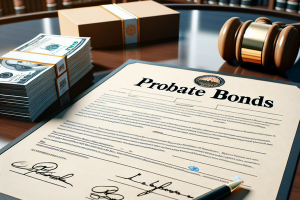Fill out the form for Kansas Administrator Probate Bond and Guardian / Conservator Probate Bond
What is a Probate Bond in Kansas?
A probate bond is a type of fiduciary bond (also known as an executor's bond) in a probate court estate. It is a Kansas state court bond that is issued on the performance of an executor or administrator of an estate. The purpose of the bond is to protect the beneficiaries or creditors of the estate from harm caused by the malfeasance or negligence of the executor or administrator.
In Kansas, a probate court bond is issued to administrators, executors, conservators and guardians in probate estates.
 How Much does a Probate Bond Cost in Kansas?
How Much does a Probate Bond Cost in Kansas?
The cost of a probate bond can vary widely depending on the amount of coverage that is required. It is based on the total amount of the estate, including any real estate, that the fiduciary has to oversee. The bond premiums are normally calculated at one-half of one percent (0.8%), which is equal to $500 for every $100,000 of estate assets. We work diligently to find the lowest premiums possible in the state of Kansas. Please call us today at (979) 314-2999. We'll find you the very best rate possible.
See our Iowa probate bond page here.
| Bond Amount Needed | Fee |
| <$20,000 | $100-$150 |
| $20,000-30,000 | $150-$200 |
| $30,000-50,000 | $200-$300 |
| $50,000+ | 0.5-0.8% |
These rates are for Merit clients, Preferred rates are 0.5% and Standard rates are 0.5 to 0.8%

How do I get an Estate Bond in Kansas?
We make it easy to get a probate bond. You can click here to get our Probate Application. Fill it out and then email it, along with the court documents requiring the bond, to [email protected] or fax it to 855-433-4192.
You can also call us at (979) 314-2999. We review each application for executor bonds and then submit it to the surety that we believe will provide the best fidelity bond for your estate. They will perform a credit check. We have a high success rate in getting our clients probate estate bonds at the best rates possible.
Exploring Estate Bonds in Kansas: Your Comprehensive Guide
From our perspective, securing a surety bond for an estate in Kansas is essential for anyone responsible for managing an estate during probate. The process may seem daunting, but it can be simplified by following these steps:
- Determine the bond amount: The Kansas probate court sets this based on the estate’s value.
- Partner with a local bond provider: Look for surety companies familiar with Kansas law.
- Submit documentation: You'll need financial and personal information for the application.
- Complete the payment: Pay a small percentage of the total bond amount as your premium.
This straightforward process ensures you meet all legal requirements, protecting both the estate and its beneficiaries.
Local Solutions for Estate Bonds in Kansas

We’ve noticed that finding a trusted surety bond provider in Kansas can feel overwhelming. However, with a few targeted strategies, you can simplify your search. Here are some tips to help you:
- Ask your probate attorney: Many attorneys have strong relationships with reputable bond providers.
- Utilize online tools: Platforms allow you to compare local bond providers, saving you time.
- Seek advice from bond brokers: They can guide you through the nuances of choosing the right provider for your needs.
These approaches can help you find a reliable estate bond provider, ensuring a smooth experience.
Why Kansas Executors Need Estate Bonds: Protecting Against Mismanagement
In our observation, an estate bond serves as a critical safeguard, ensuring that the executor or administrator of an estate fulfills their duties properly. But what happens if they don’t? For instance, if an executor in Kansas mismanages the estate's funds—whether intentionally or through negligence—the estate bond compensates the affected beneficiaries.
This makes estate bonds a financial safety net, protecting the estate from potential mismanagement or fraud.
How Estate Bonds Operate in Kansas Probate Court
Based on our experience, the Kansas probate court system relies on estate bonds to ensure that estate matters are handled with care. Here's how the system works:
- The court requires a bond before an executor can begin administering the estate.
- The bond is monitored by the court to ensure compliance.
- If an issue arises, beneficiaries can file a claim, holding the executor accountable.
Kansas courts use estate bonds to create transparency and accountability throughout the probate process.
 Uncovering the Roles in Estate Bonds: Who Really Benefits?
Uncovering the Roles in Estate Bonds: Who Really Benefits?
We’ve learned that many people are unclear about who an estate bond is meant to protect. In Kansas, the bond serves the estate's beneficiaries. Although the executor purchases the bond, its primary role is to ensure they manage the estate responsibly. If they fail, the beneficiaries are the ones protected through the bond’s financial backing.
Breaking Down Court Bonds in Kansas
What we’ve discovered is that court bonds in Kansas come in many forms, but estate bonds serve a very specific purpose. While other bonds may apply to appeals, injunctions, or other legal matters, an estate bond is designed specifically to protect the beneficiaries of a probate case. The bond ensures that the estate is managed according to Kansas law and without harm to those who inherit.
Here’s a quick comparison:
- Estate bonds: Protect the estate's beneficiaries by ensuring proper management.
- Other court bonds: Protect against specific legal risks during court proceedings.
By understanding these distinctions, you can better navigate Kansas’s legal requirements during probate.
The Kansas Process for Securing an Estate Bond
Our experience tells us that securing an estate bond in Kansas is easier than it may seem, especially when you know the process. To get started:
- Select a Kansas-approved surety bond provider who specializes in estate bonds.
- Gather your documents, including estate details and personal identification.
- Pay your premium, which is typically a small fraction of the bond’s total amount.
- Submit the bond to the court for final approval, allowing you to begin managing the estate.
These steps ensure compliance with Kansas’s probate laws, helping you fulfill your duties as an executor or administrator.
Final Thoughts: Why Estate Bonds Matter in Kansas

We’ve come to appreciate that estate bonds are not just bureaucratic requirements—they provide essential protection for beneficiaries. Whether you're managing an estate or a beneficiary, understanding how surety bonds work in Kansas can safeguard everyone involved. If you’re ready to secure an estate bond in Kansas, consider reaching out to a bond expert for personalized guidance.
We provide probate bonds in each of the following counties:
| Allen | Greeley | Osborne |
| Anderson | Greenwood | Ottawa |
| Atchison | Hamilton | Pawnee |
| Barber | Harper | Phillips |
| Barton | Harvey | Pottawatomie |
| Bourbon | Haskell | Pratt |
| Brown | Hodgeman | Rawlins |
| Butler | Jackson | Reno |
| Chase | Jefferson | Republic |
| Chautauqua | Jewell | Rice |
| Cherokee | Johnson | Riley |
| Cheyenne | Kearny | Rooks |
| Clark | Kingman | Rush |
| Clay | Kiowa | Russell |
| Cloud | Labette | Saline |
| Coffey | Lane | Scott |
| Comanche | Leavenworth | Sedgwick |
| Cowley | Lincoln | Seward |
| Crawford | Linn | Shawnee |
| Decatur | Logan | Sheridan |
| Dickinson | Lyon | Sherman |
| Doniphan | Marion | Smith |
| Douglas | Marshall | Stafford |
| Edwards | McPherson | Stanton |
| Elk | Meade | Stevens |
| Ellis | Miami | Sumner |
| Ellsworth | Mitchell | Thomas |
| Finney | Montgomery | Trego |
| Ford | Morris | Wabaunsee |
| Franklin | Morton | Wallace |
| Geary | Nemaha | Washington |
| Gove | Neosho | Wichita |
| Graham | Ness | Wilson |
| Grant | Norton | Woodson |
| Gray | Osage | Wyandotte |
See our Kentucky probate bond page here.
Learn more on how much does a will cost in Kansas?
Fill out the form for Kansas Administrator Probate Bond and Guardian / Conservator Probate Bond


